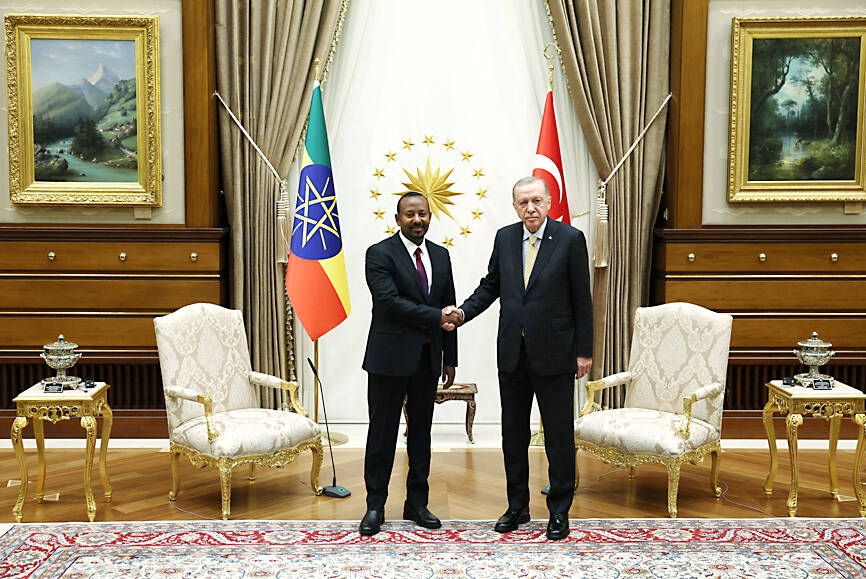Ethiopia and Somalia on Wednesday agreed to hold “technical talks” to resolve a dispute sparked by Ethiopia’s deal with Somalia’s breakaway region of Somaliland, according to a statement following talks in Turkey.
Turkey has been mediating between the two east African countries as tensions between them have simmered since Ethiopia signed a memorandum of understanding with Somaliland in January to lease land along its coastline to establish a marine force base.
In return, Ethiopia would recognize Somaliland’s independence, which Somalia says infringes on its sovereignty and territory.

Photo: AFP / Turkish Presidental Press Service
A joint declaration was reached after Turkish President Recep Tayyip Erdogan met separately with Somalian President Hassan Sheik Mohamud and Ethiopian Prime Minister Abiy Ahmed on Wednesday.
The sides agreed that the talks, which would begin by February and conclude within four months, would respect Somalia’s territorial integrity while recognizing “potential benefits” of Ethiopia’s access to the sea, the statement says.
The sides would work to “finalize mutually advantageous commercial arrangements” to allow Ethiopia “to enjoy reliable, secure and sustainable access to and from the sea,” under Somalian sovereignty, it says.
Somaliland seceded from Somalia more than 30 years ago, but is not recognized by the African Union or the UN as an independent state. Somalia still considers Somaliland part of its territory.
Somaliland has built a stable political environment, contrasting sharply with Somalia’s ongoing struggles with insecurity amid deadly attacks by al-Qaeda-linked militant group al-Shabaab. Somaliland last month held a presidential election that boosted its push for international recognition.
Erdogan, flanked by Mohamud and Abiy, told reporters at a news conference in the Turkish capital that the sides have reached an “important stage” in efforts to solve their dispute.
The joint declaration focuses “on the future and not the past,” he said. “By overcoming some resentments and misunderstandings, we have taken the first step toward a new beginning based on peace and cooperation between Somalia and Ethiopia.”
He also said he hoped Somalia would take steps to give Ethiopia sea access.
Abiy said that “Ethiopia’s aspiration for secure access to the sea is a peaceful venture and one that would benefit all our neighbors.”
“I believe that today’s constructive discussions will push us into a new year with this spirit of cooperation, friendship and the willingness to work together instead of against each other,” he said.
Mohamud said that the Horn of Africa is a “very fragile and very volatile region, which needs both Ethiopia and Somalia to work together” for the benefit of both.

PREPAREDNESS: Given the difficulty of importing ammunition during wartime, the Ministry of National Defense said it would prioritize ‘coproduction’ partnerships A newly formed unit of the Marine Corps tasked with land-based security operations has recently replaced its aging, domestically produced rifles with more advanced, US-made M4A1 rifles, a source said yesterday. The unnamed source familiar with the matter said the First Security Battalion of the Marine Corps’ Air Defense and Base Guard Group has replaced its older T65K2 rifles, which have been in service since the late 1980s, with the newly received M4A1s. The source did not say exactly when the upgrade took place or how many M4A1s were issued to the battalion. The confirmation came after Chinese-language media reported

A Ministry of Foreign Affairs official yesterday said that a delegation that visited China for an APEC meeting did not receive any kind of treatment that downgraded Taiwan’s sovereignty. Department of International Organizations Director-General Jonathan Sun (孫儉元) said that he and a group of ministry officials visited Shenzhen, China, to attend the APEC Informal Senior Officials’ Meeting last month. The trip went “smoothly and safely” for all Taiwanese delegates, as the Chinese side arranged the trip in accordance with long-standing practices, Sun said at the ministry’s weekly briefing. The Taiwanese group did not encounter any political suppression, he said. Sun made the remarks when

The Taiwanese passport ranked 33rd in a global listing of passports by convenience this month, rising three places from last month’s ranking, but matching its position in January last year. The Henley Passport Index, an international ranking of passports by the number of designations its holder can travel to without a visa, showed that the Taiwan passport enables holders to travel to 139 countries and territories without a visa. Singapore’s passport was ranked the most powerful with visa-free access to 192 destinations out of 227, according to the index published on Tuesday by UK-based migration investment consultancy firm Henley and Partners. Japan’s and

BROAD AGREEMENT: The two are nearing a trade deal to reduce Taiwan’s tariff to 15% and a commitment for TSMC to build five more fabs, a ‘New York Times’ report said Taiwan and the US have reached a broad consensus on a trade deal, the Executive Yuan’s Office of Trade Negotiations said yesterday, after a report said that Washington is set to reduce Taiwan’s tariff rate to 15 percent. The New York Times on Monday reported that the two nations are nearing a trade deal to reduce Taiwan’s tariff rate to 15 percent and commit Taiwan Semiconductor Manufacturing Co (TSMC, 台積電) to building at least five more facilities in the US. “The agreement, which has been under negotiation for months, is being legally scrubbed and could be announced this month,” the paper said,